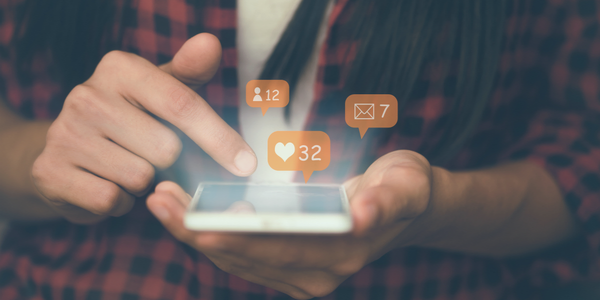
Can or how does social media affect obesity? It's probably obvious that there is a social media impact on health. However, trends like social weight loss and weight loss social media posts are more subtle.
Read on to understand the five real ways social media impacts health every day (and what to do about it).
Social Media's Impact On Health
Since the early 2000s, "diet culture" has come to light. This term refers to a dangerous set of beliefs that prioritize thin bodies over well-being. While this has prompted a lot of thinness in the media, it can actually lead to obesity and disordered eating for many people.
Diet culture encourages grouping foods into "good" and "bad" categories, which can villainize certain foods. When one tells their body "no," it can be easier to overeat that "unhealthy" food when one gets the chance.
Social media, especially for young people and teens with growing bodies, is a source of information. "Influencers" are often used as benchmarks for how bodies should look.
Additionally, reports suggest over half of people edit their social media posts in some way. Meaning, that anything from skin tone to waistlines may not be accurate.
How Does Social Media Affect Obesity?
It's no secret that screen time and social media can make it easy to overeat. Here are five ways that social media can harm health goals.
1. Self-Image
Nearly two hours of each day are spent on social media - that's almost 20 days of each year when all added up! Time spent and invested in apps and platforms can easily influence self-image.
2. Skewed Portion Sizes
Regular intake of social media skews what seems "normal" or acceptable. Often, users normalize excessive portion sizes or portion sizes that are way too small based entirely on what they see in their social media feed.
3. Screen-Distracted Eating
It may seem like an obvious side effect, but scrolling through social media while eating can lead to distracted eating. Usually, distracted eating leads to eating more than one would when intuitively tuning in.
4. Setting Expectations
Some people use what they see on social media to set the standard for themselves. This can lead to unrealistic (and unhealthy) goals and perceptions. Many forget that their favorite influencers have full-time schedules to pursue health and wellness, often combined with deep wallets for supplemental surgeries and procedures to appear thin.
5. Smart Social Ads
On top of what has been listed above, social media feeds are getting smarter. Ways to shop and ads tailored to individual scrolling patterns are clue-ing in on user behaviors. Side effects may seem harmless, but studies show social media usage is tied to disordered eating.
How To Avoid the Toxic Effects of Social Media
The use of social media is not all bad! In fact, the Journal of Interactive Marketing suggests social media may boost weight loss success. Some of the posts seen on social media can be motivators for weight loss goals, healthier habits, and so on.
Utilize social media by seeing it as a tool that is either helping to build a healthier life, or helping to tear it down. Use it as a resource for virtual support or community, healthy recipes, and beyond. Also, connecting with dietitians online and other social networking can be a great way to further health goals!
More social media consumption often means heightened body weight concerns. So when in doubt, head outside! Enjoy mindful movement and intuitive eating practices to become more in tune with the body.
In Summary on Social Media & Obesity
Diet culture shows that trends change. Diet truths, on the other hand, often remain the same.
Focusing on mindful health habits can take the pressure of social media away. It can also improve self-image, encourage a balanced weight, nurture a healthy lifestyle, and even more.
References:
Amidor T. Popular Diet Trends: Instagram Diet Trends. Today's Dietitian. Published May 2020. https://www.todaysdietitian.com/newarchives/0520p16.shtml.
Daryanani A. What Is "Diet Culture"? UC San Diego Recreation. Published January 28, 2021. https://recreation.ucsd.edu/2021/01/diet-culture-social-media/.
Garone S. How Does Social Media Affect Eating Habits. Verywell Fit. Updated June 18, 2021. https://www.verywellfit.com/how-does-social-media-affect-eating-habits-5188578.





